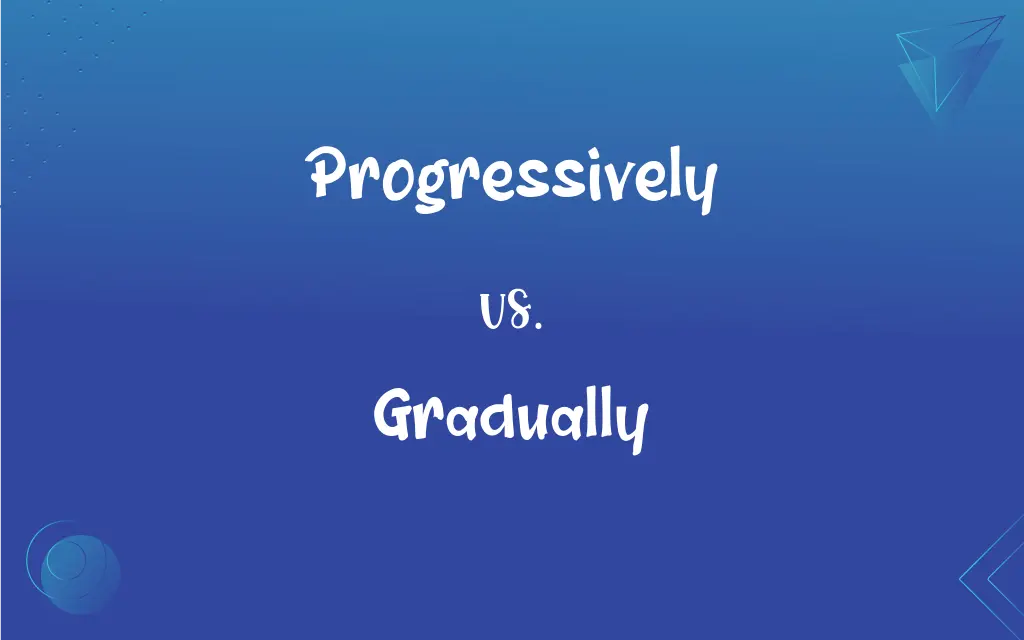Progressively vs. Gradually: What's the Difference?
Edited by Harlon Moss || By Janet White || Updated on October 5, 2023
"Progressively" indicates advancement toward a specific goal, while "gradually" signifies a slow or incremental change without necessarily aiming towards an endpoint.

Key Differences
Both "progressively" and "gradually" describe processes that unfold over time. However, "progressively" typically implies movement towards an improved state or specific endpoint, emphasizing the nature of the progress. On the other hand, "gradually" describes a slow and steady change without indicating any specific direction or goal.
"Progressively" carries a connotation of enhancement or forward momentum. For instance, a student could be said to be "progressively understanding" a concept, indicating continuous improvement. In contrast, "gradually" simply denotes a measured pace. A day that dawns "gradually" doesn't imply it's getting better, just that it's unfolding at a slow pace.
While "progressively" often has a positive tone, suggesting advancement, "gradually" is neutral in this respect. If a situation is deteriorating "gradually", it emphasizes the pace, not the direction. But if a situation is deteriorating "progressively", it might imply a consistent path of worsening conditions.
Context plays a crucial role in determining the subtle nuances of "progressively" and "gradually". In the realm of physical training, one might improve "progressively", denoting stages of advancement. Meanwhile, strength could increase "gradually", emphasizing the slow buildup.
To sum up, while both "progressively" and "gradually" signify unfolding over time, "progressively" is more about the journey and its direction, often towards betterment. "Gradually", on the other hand, emphasizes pace without implying any specific endpoint or direction.
ADVERTISEMENT
Comparison Chart
Connotation
Positive, indicating advancement
Neutral, indicating pace
Directionality
Implies a specific goal or endpoint
Does not imply a specific goal
Pace
May or may not indicate pace
Specifically indicates a slow pace
Contextual use
Often used in contexts of improvement
Commonly used in contexts of slow change
Tone
Can imply a sense of purpose or intent
Neutral, just describes the speed of change
ADVERTISEMENT
Progressively and Gradually Definitions
Progressively
Indicating continuous improvement.
Her skills improved progressively over the years.*
Gradually
Over a period of time.
The days are gradually getting shorter.*
Progressively
In a manner that advances in stages.
The course gets progressively harder.*
Gradually
Without sudden changes.
He gradually adjusted to the new environment.*
Progressively
Moving closer to a specific goal.
We are working progressively towards a solution.*
Gradually
At a slow pace.
The snow melted gradually as the sun rose.*
Progressively
Steadily increasing in intensity or extent.
The pain grew progressively worse.*
Gradually
Bit by bit.
The bird gradually built its nest over several days.*
Progressively
Moving forward; advancing.
Gradually
In incremental steps.
She gradually increased the difficulty of her workouts.*
Progressively
Proceeding in steps; continuing steadily by increments
Progressive change.
Gradually
Occurring or developing slowly or by small increments
Gradual erosion.
A gradual slope.
Progressively
Open to or favoring new ideas, policies, or methods
A progressive politician.
Progressive business leadership.
Gradually
The liturgical book containing the chants for the Mass.
Progressively
Progressive Of or relating to a Progressive Party
The Progressive platform of 1924.
Gradually
A biblical text sung between the Epistle and the Gospel of the Mass.
Progressively
Of or relating to progressive education
A progressive school.
Gradually
In a gradual manner; making slow progress; slowly.
Progressively
Increasing in rate as the taxable amount increases
A progressive income tax.
Gradually
(obsolete) by degrees
Progressively
Tending to become more severe or wider in scope
Progressive paralysis.
Gradually
In a gradual manner.
Progressively
(Grammar) Designating a verb form that expresses an action or condition in progress.
Gradually
In degree.
Human reason doth not only gradually, but specifically, differ from the fantastic reason of brutes.
Progressively
(Music) Of or being a style that emphasizes virtuoso technique, rhythmic and melodic complexity, and unconventional forms and instrumentation
Progressive rock.
Progressive jazz.
Gradually
In a gradual manner;
The snake moved gradually toward its victim
Progressively
A person who is open to or favors new ideas, policies, or methods, especially in politics.
Progressively
Progressive A member or supporter of a Progressive Party.
Progressively
(Grammar) A progressive verb form.
Progressively
In a progressive manner.
Progressively
As part of a progression.
Progressively
Advancing in amount or intensity;
She became increasingly depressed
Progressively
Evolving with a sense of direction.
The story unfolded progressively, keeping readers engaged.*
FAQs
Can "progressively" indicate a negative trend?
Yes, it can, like in "conditions worsened progressively."
Is "gradually" always about something slow?
Typically, "gradually" indicates a slow, measured change.
Can you replace "progressively" with "gradually" in any sentence?
Not always. The context and intended nuance dictate their interchangeability.
Is "progressively" more goal-oriented than "gradually"?
Generally, "progressively" indicates movement toward a goal, while "gradually" does not.
Can "gradually" describe positive changes?
Yes, it's neutral; it can describe positive, negative, or neutral changes.
Which word is better for describing the pace of change: "progressively" or "gradually"?
"Gradually" is more specifically about pace.
Can "gradually" describe a rapid change?
No, "gradually" indicates a slow or incremental change.
Do "progressively" and "gradually" mean the same thing?
While similar, "progressively" implies advancement, while "gradually" emphasizes pace.
Is "progressively" always positive?
No, but it often has a connotation of advancement or progression.
Are "progressively" and "gradually" adverbs?
Yes, both words are adverbs.
Are "progressively" and "gradually" formal words?
Both are standard English words used in both formal and informal contexts.
Would you use "gradually" to describe abrupt changes?
No, "gradually" indicates slow and incremental changes.
Can a situation improve "gradually"?
Yes, "gradually" can describe the pace of any change, including improvement.
Which word would you use to describe a steady increase in difficulty: "progressively" or "gradually"?
"Progressively" is more apt for indicating increasing levels of difficulty.
Which word emphasizes the manner of change more: "progressively" or "gradually"?
"Progressively" emphasizes the nature and direction of change, while "gradually" emphasizes its pace.
Does "progressively" always indicate forward movement?
While it suggests progression, the direction (forward or backward) depends on context.
Does "progressively" always mean in stages?
Not always, but it can indicate staged or phased development.
Is "gradually" about the journey or the destination?
It's about the journey, specifically the pace of the journey.
Can a situation worsen "gradually"?
Yes, it can deteriorate at a slow pace.
Can "progressively" indicate a lack of change?
No, "progressively" suggests some form of evolution or change.
About Author
Written by
Janet WhiteJanet White has been an esteemed writer and blogger for Difference Wiki. Holding a Master's degree in Science and Medical Journalism from the prestigious Boston University, she has consistently demonstrated her expertise and passion for her field. When she's not immersed in her work, Janet relishes her time exercising, delving into a good book, and cherishing moments with friends and family.
Edited by
Harlon MossHarlon is a seasoned quality moderator and accomplished content writer for Difference Wiki. An alumnus of the prestigious University of California, he earned his degree in Computer Science. Leveraging his academic background, Harlon brings a meticulous and informed perspective to his work, ensuring content accuracy and excellence.































































